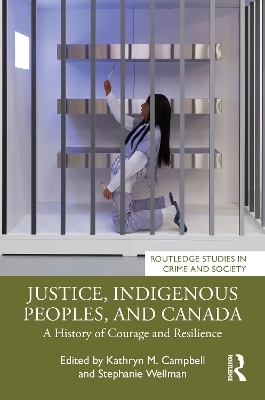
Justice, Indigenous Peoples, and Canada
Routledge (Verlag)
978-0-367-07455-5 (ISBN)
Justice, Indigenous Peoples, and Canada: A History of Courage and Resilience brings together the work of a number of leading researchers to provide a broad overview of criminal justice issues that Indigenous people in Canada have faced historically and continue to face today. Both Indigenous and Canadian scholars situate current issues of justice for Indigenous peoples, broadly defined, within the context of historical realities and ongoing developments.
By examining how justice is defined, both from within Indigenous communities and outside of them, this volume examines the force of Constitutional reform and subsequent case law on Indigenous rights historically and in contemporary contexts. It then expands the discussion to include theoretical considerations, particularly settler colonialism, that help explain how ongoing oppressive and assimilationist agendas continue to affect how so-called "justice" is administered. From a critical perspective, the book examines the operation of the criminal justice system, through bail, specialized courts, policing, sentencing, incarceration and release. It explores legal frameworks as well as current issues that have significantly affected Indigenous peoples, such as the Truth and Reconciliation Commission, the Inquiry into Missing and Murdered Indigenous Women and Girls, human rights, resurgence and identity. This unique collection of perspectives exposes the disconcerting agenda of historical and modern-day Canadian federal government policy and the continued denial of Indigenous rights to self-determination. It is essential reading for those interested in the struggles of the Indigenous peoples in Canada as well as anyone studying race, crime and justice.
Kathryn M. Campbell is a Full Professor of Criminology at the University of Ottawa, Ontario, Canada. She holds a BA in Psychology (McGill), an MPhil in Criminology (Cantab), a PhD in Criminologie (Université de Montreal) and a BCL/LLB (McGill). Professor Campbell has long been interested in studying issues of social justice, including questions of equality and rights under the law, for various individuals and groups. Professor Campbell has published extensively in the areas of miscarriages of justice, young persons and criminal law and Indigenous justice issues. Stephanie Wellman is Manitoba Métis from Treaty One Territory, now residing on the traditional unceded, unsurrendered Territory of the Anishinaabe Algonquin Nation. She holds an MA in Criminology from the University of Ottawa; her research focused on Indigenous over-incarceration in Canadian prisons and issues of identity. She is currently the Director of Social Development at the Assembly of First Nations.
Introduction. Part 1: Questions of Theory and Justice. Chapter 1. Justicia Canadiana. Chapter 2. Settler Colonialism and the Criminalization of Indigenous People in Canada. Chapter 3. Frail Legitimacies: Examining the Settler Colonial Legal-Politics Underlying the Wet’suwet’en Crisis. Chapter 4. A Strategy for Achieving Indigenous Justice: A Seven “R” Plan. Part 2: Features of the Criminal Justice System. Chapter 5. A Commentary on First Nations Policing. Chapter 6. Swimming Upstream in the Criminal Justice System: The Role of the Bail System in the Over-representation of Indigenous Peoples in Canadian Correction Facilities. Chapter 7. Attempts at Reconciliation Through Criminal Law: Tracing the Historical Applications of the Gladue Principles. Chapter 8. Criminal Justice Reform and the Mass Imprisonment of Indigenous People in Canada. Chapter 9. Indigenous Women: Living in a State of Injustice. Reflections on the Aboriginal Justice Inquiry of Manitoba and Continued Injustices faced by Indigenous women in Canada. Part 3: In/Justice in Practice. Chapter 10. Family Matters: Home is the Heart of the Indigenous Prison Crisis. Chapter 11. Indigenous Identity and Correctional Programming: The Effects of a Contemporary Colonial Project. Chapter 12. Leaving the Iron House: The Red Road Out of Prison. Chapter 13. The Duty to Do Better: Becoming a Trauma-Informed Lawyer. Chapter 14. Indigenous People Courts: A Commentary.
| Erscheinungsdatum | 21.12.2023 |
|---|---|
| Reihe/Serie | Routledge Studies in Crime and Society |
| Zusatzinfo | 5 Tables, black and white; 2 Line drawings, black and white; 11 Halftones, black and white; 13 Illustrations, black and white |
| Verlagsort | London |
| Sprache | englisch |
| Maße | 152 x 229 mm |
| Gewicht | 843 g |
| Themenwelt | Recht / Steuern ► EU / Internationales Recht |
| Recht / Steuern ► Strafrecht ► Kriminologie | |
| Recht / Steuern ► Strafrecht ► Strafverfahrensrecht | |
| ISBN-10 | 0-367-07455-9 / 0367074559 |
| ISBN-13 | 978-0-367-07455-5 / 9780367074555 |
| Zustand | Neuware |
| Informationen gemäß Produktsicherheitsverordnung (GPSR) | |
| Haben Sie eine Frage zum Produkt? |
aus dem Bereich


